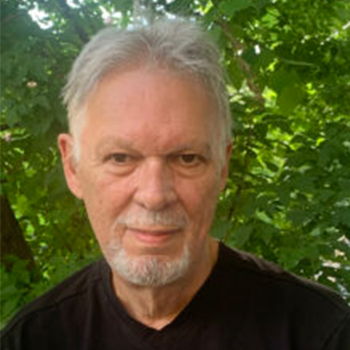Interviewing has been a passion for Writing Department Adjunct Professor Paul McLaughlin, ever since he lucked into his first job as a researcher for CBC Radio in Ottawa.
“I was hired off the street. I’d never gone to journalism school, so I had to learn how to interview people, including high-level politicians, business executives and artists, through trial and error. It was as much the latter as the former, especially in the early days,” he says.
His understanding of how challenging the interview process can be led him to write his first book on the topic, Asking Questions: The Art of the Media Interview, in 1986. One of his idols, Patrick Watson, who was then Chair of the CBC, gave him a cover quote: “This humane, intelligent, insightful book is not only useful but also a very good, entertaining read.”
Prior to joining York in 2006, McLaughlin spent 20 years at the Ryerson School of Journalism and three years at Carleton’s School of Journalism. “Teaching taught me how much students needed help in learning interviewing,” he says. As a result, he makes interviewing training part of the two courses he teaches: WRIT 3002 Introduction to Periodical Writing and Publishing, and WRIT 4002, Advanced Topics in Periodical Writing.
McLaughlin’s first interviewing bookwas published before the internet and social media changed the journalism landscape forever. That’s a major reason why he’s written a new how-to: Asking the Best Questions: A comprehensive interviewing handbook for journalists, podcasters, bloggers, vloggers, influencers, and anyone who asks questions under pressure. It’s published by Centennial College Press and is available this fall.

“Almost all of the book is new material,” he says. “Hopefully I learned a few more things since the first came out. It also references people, like Oprah Winfrey and podcaster Marc Maron, who were not in the first book. In fact, many of the people I quoted in Asking Questions are no longer with us and would not be known by young readers.”
The book breaks down the interviewing process in short, easy-to-read chapters. He shares his and other interviewers’ experiences, good and bad, as well as his psychological and philosophical approaches to an undertaking he calls “an art.”
Of particular interest is what McLaughlin calls “the holy trinity of interviewing:” listening, silence and tone. “Many people who start out conducting interviews think their goal is to sound smart, ask penetrating questions and get an interviewee to confess or reveal all because of their brilliance. But it’s almost never that. The most important thing to do is probably the hardest, which is to listen with all your being. Most of us are poor listeners. Interviewers who want to succeed at this fascinating process need to be able to listen to a degree that is almost preternatural.”
Although McLaughlin has interviewed heads of state, business tycoons, authors and actors, he says his favourite interviews are with people who are rarely, if ever, interviewed. “Too many people these days are quite packaged in their responses. They’re cautious and manipulative. I prefer people who just talk to you without a media-training filter.”
A lifelong freelancer, McLaughlin has taught journalism and writing at Carleton, Ryerson (now Toronto Metropolitan) and York for more than four decades. Over the years, he’s worked as a producer and broadcaster at CBC Radio, written for most major Canadian magazines, served as CBC’s interviewing trainer, penned about a dozen books and had several of his plays performed professionally.
He also does interviews, almost daily, for his work, which currently involves several books. “I love talking to people,” he says. “I learn so much from interviewing, about other people and what matters to them, but also about myself. I consider it a privilege to explore their world, however firefly. It’s a wonderful way to go through life.”
The book will be available on Oct.17 in print form, and is available now in ebook format. His website is www.paulmclaughlin.ca.
Originally published in YFile.
